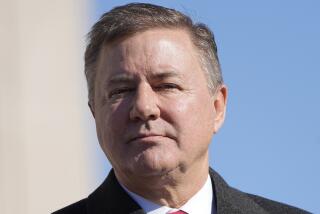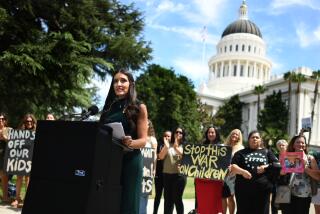Catholic Bishops Adopt Lobby Effort for Parochial Schooling
- Share via
WASHINGTON — The nation’s Roman Catholic bishops Wednesday agreed to launch a major new lobbying effort to win government aid for families who send their children to religious schools.
“This is the last civil rights struggle,” said Bishop Edward Eagan of Bridgeport, Conn. He added that he was “outraged” that “all tax money goes to (public) schools where religion is not taught.”
The “parental choice” program, approved, 241 to 10, at the annual meeting of the National Conference of Catholic Bishops, also included a campaign to raise millions for financially strapped Catholic schools through endowments and increased donations from corporations and foundations.
Two million dollars in seed money will be used to establish a national office that will help parents’ groups push state legislatures and the U.S. Congress to authorize parental choice funding plans.
The bishops set 1992 as a deadline for setting up organizations of Catholic school parents prepared to lobby at the diocesan, state and national levels. The Catholic school system currently serves 630,000 high school and nearly 2 million elementary school students.
The statement did not outline clearly how “parental choice” would work but focused instead on the general idea that legislation should provide financial assistance to “ensure (that) parents can afford to choose the type of schooling they desire for their children.”
In other action Wednesday, the bishops by voice vote approved guidelines for sex education in Catholic schools. A number of more conservative bishops objected that the program lacked sufficient parental input.
Austin B. Vaughan, auxiliary bishop of New York, said: “We are all celibate, none of us is a parent, and by the standards of the U.S. government we are all aged.” How then, he asked, should the bishops presume to impose on Catholic parents a guideline to sex education without seeking their views?
The conservatives also complained that the document, which deals at length with difficult issues such as homosexuality, contraception and AIDS, was not made public until this week’s conference.
The bishops also approved unanimously a statement authorizing a special national collection in parish churches to raise money for the newly liberated Catholic churches of Eastern Europe.
The collection, while optional, is likely to raise at least $10 million annually said John L. May, archbishop of St. Louis, who introduced the resolution.
The statement on funding for Catholic education stressed the role parochial schools have played in offering quality education to minorities in inner city school districts. But it also noted that as costs have increased fivefold in the past 20 years, enrollment of children of all Catholic parents has steadily declined. Currently, 27% of Catholic elementary age children are in Catholic elementary schools and 22% of high school age Catholics are in the church’s high schools.
More to Read
Sign up for Essential California
The most important California stories and recommendations in your inbox every morning.
You may occasionally receive promotional content from the Los Angeles Times.













